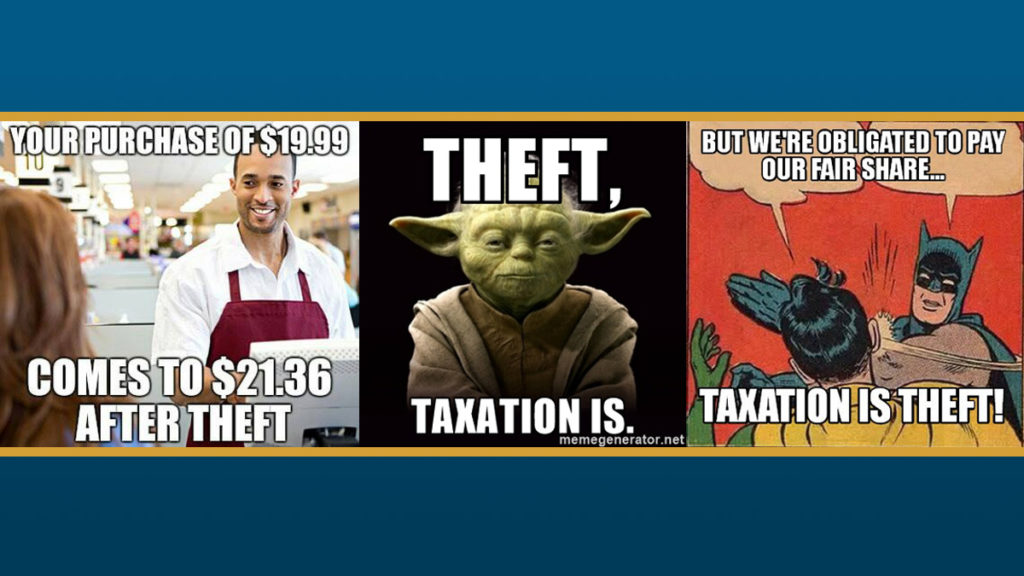I like a good meme as much as the next person. And when that meme expresses a libertarian principle, all the better. That said, I have my doubts about the “taxation is theft” meme making the rounds on my Facebook feed.
The idea that taxation is morally equivalent to theft goes at least as far back as 19th century philosopher, lawyer, entrepreneur, and historically unrivaled beard wearer Lysander Spooner:
The government, like a highwayman, says to a man: Your money, or your life. And many, if not most, taxes are paid under the compulsion of that threat. The government does not, indeed, waylay a man in a lonely place, spring upon him from the road side, and, holding a pistol to his head, proceed to rifle his pockets. But the robbery is none the less a robbery on that account.”]
At first glance, Spooner’s analogy between the government and the highwayman seems compelling. Both demand that you hand over the contents of your wallet under the threat of force. Even if the highwayman uses your money for a noble purpose like charity, the fact remains that he stole that money.
So, is taxation theft? I’m not convinced. To start, notice that Spooner is assuming the person under threat doesn’t owe the money to the highwayman. If you “dined-and-dashed” at the highwayman’s cafe and he’s come to collect the bill, the interaction starts looking less like a robbery. This means that if you want to argue that taxation is theft, you’ll need to show that taxpayers aren’t obligated to pay their taxes. And that’s going to take some work.
So, is taxation theft? I’m not convinced.”]
For instance, it could be the case that you’re only entitled to your post-tax income because the protection of a tax-funded state is a precondition of your possessing income in the first place. According to this argument, if it weren’t for government services like the police and the military, you’d be unable to earn a living, enforce your property rights, and accumulate wealth. Thus, you can’t complain when the IRS takes a chunk of your paycheck so that the state can do its job.
Another view holds that taxation is justified as a way of ensuring the justness of the very system that distributes wealth and income. For instance, why is Elon Musk entitled to millions of dollars while others have so much less? On John Rawls’s theory of distributive justice, Musk may justifiably take home more money only if doing so works to the benefit of the poor, say, by increasing the tax revenue used to fund anti-poverty programs. So if Musk’s income weren’t taxed to help the poor, he wouldn’t have a moral claim on that income in the first place.
Even on a straightforwardly libertarian theory of property, it’s not clear that real-world taxation is theft. Consider Robert Nozick’s view that (roughly) you are entitled to the property that you take from the unowned commons (so long as you don’t make others worse off) and to the property that has been voluntarily transferred to you in the form of wages, gifts, sales, and so on.
Even on a straightforwardly libertarian theory of property, it’s not clear that real-world taxation is theft.”]
The trouble is, the real-world distribution of property has been thoroughly contaminated by injustice. Historical injustices like slavery and Jim Crow influenced the present-day distribution of wealth. If you trace the history of your wealth back far enough, you’ll undoubtedly find that it’s been affected by injustice. Contemporary policies like immigration restrictions, trade restrictions, and occupational licensing also violate Nozick’s rules for acquiring property. So the real-world distribution of wealth and income is very different from a libertarian-approved distribution of wealth and income. Even within a libertarian framework, then, we have reason to doubt that we’re morally entitled to our current wealth and income.
Of course, taxation might be bad for other reasons. For instance, there is evidence that your tax dollars aren’t spent very efficiently. And, taxation can slow economic growth, a result that’s bad for everyone, including the poor. But saying that taxation is unwise is different than saying taxation is theft.



